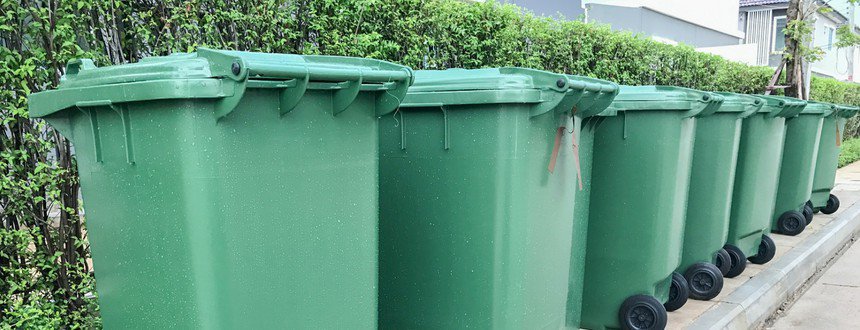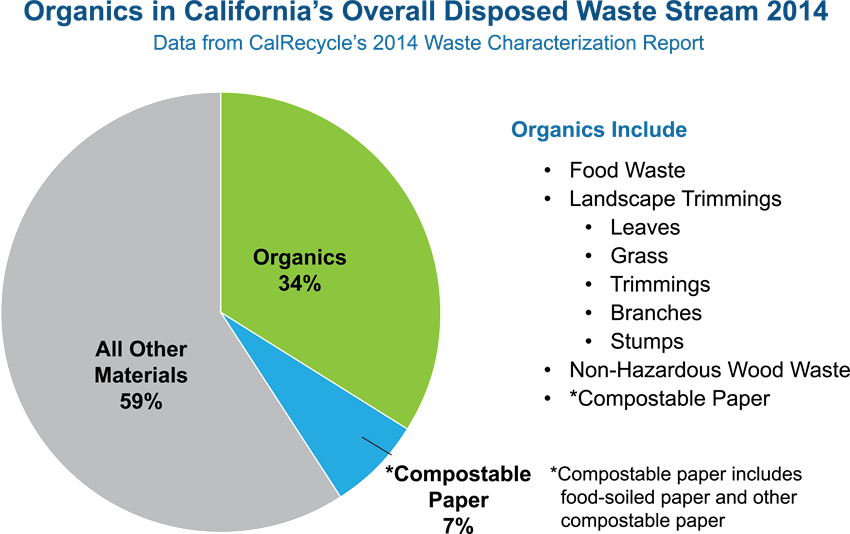
- General Information
- Business Requirements and Resources
- Local Government Requirements and Resources
- CalRecycle Requirements
- Frequently Asked Questions
- Listserv
- Related Resources
General Information
Background and Overview
In October 2014 Governor Brown signed AB 1826 Chesbro (Chapter 727, Statutes of 2014), requiring businesses to recycle their organic waste on and after April 1, 2016, depending on the amount of waste they generate per week. This law also requires that on and after January 1, 2016, local jurisdictions across the state implement an organic waste recycling program to divert organic waste generated by businesses, including multifamily residential dwellings that consist of five or more units (please note, however, that multifamily dwellings are not required to have a food waste diversion program). Organic waste (also referred to as organics throughout this resource), for the purposes of AB 1826, means food waste, green waste, landscape and pruning waste, nonhazardous wood waste, and food-soiled paper waste that is mixed in with food waste.
The law phased in the requirements for businesses over time, while offering an exemption process for rural counties.
The law contains a 2020 trigger that further increased the scope of affected businesses.
In September of 2020, CalRecycle reduced the threshold to 2 cubic yards of solid waste (solid waste is the total of trash, recycling, and organics) generated by covered businesses. Click here to see the initial implementation schedule.
Program News...
- In January 2017, a memo from CalRecycle Director, Scott Smithline, was sent to all Jurisdiction and Annual Report Contacts outlining at any time Jurisdiction Reviews of Mandatory Commercial Recycling and Commercial Organics Recycling Programs.
- Flyer and Brochure for schools regarding AB 1826 and small scale composting, respectively.
- Recycling and Organics Recycling Guide for Business Brochure
- Education/Outreach Tools
- AB 876 Guidance and Calculator–CalRecycle created guidance and a calculator to assist jurisdictions with longer term planning for organics infrastructure.

Why Organics?
Mandatory recycling of organic waste is the next step toward achieving California’s aggressive recycling and greenhouse gas (GHG) emission goals. California disposes approximately 30 million tons of waste in landfills each year, of which more than 30 percent could be used for compost or mulch (see the 2014 Waste Characterization Study). Organic waste such as green materials and food materials are recyclable through composting and mulching, and through anaerobic digestion, which can produce renewable energy and fuel. Greenhouse gas (GHG) emissions resulting from the decomposition of organic wastes in landfills have been identified as a significant source of emissions contributing to global climate change. Reducing the amount of organic materials sent to landfills and increasing the production of compost and mulch are part of the AB 32 (California Global Warming Solutions Act of 2006) Scoping Plan. For more information on the connection between the waste sector and California’s GHG emission reduction goals, please see CalRecycle’s Climate Change page.
Related Recources
Find a Composter Near You
Locate compost and/or mulch facilities by county and feedstock accepted.
California Green Business Network
The California Green Business Program is a network of local programs operated by counties and cities throughout California.
CoolCalifornia.org
Cool California provides resources for small businesses, schools, and schools districts, including a carbon calculator, sustainability activities, success stories, funding wizard, and an awards program.
The Foodservice Packaging Institute
The Institute offers free resources that are tailored toward key stakeholders, including communities, material recovery facilities, composters, anaerobic digestion facilities and recycling end markets. Resources include overviews of California-specific recycling and composting studies, an interactive map of end markets, information sheets for materials recovery facilities, resident outreach materials, and more.
AmpleHarvest.org
AmpleHarvest.org is a unique nationwide resource that is eliminating the waste of food, the outcome being a reduction in hunger and malnutrition along with an improved environment. It is accomplished by utilizing the Internet to enable 42 million Americans who grow food in home/community gardens to easily donate their excess harvest to one of 8,563 registered local food pantries spread across all 50 states. These food pantries help nourish the one out of six Americans (including a quarter of all kids under six) that rely on these pantries.
The Institute for Local Self-Reliance: Community Composting
The Institute for Local Self Reliance has released Community Composting Done Right: A Guide to Best Management Practices. Resources include a full report, a summary of best management practices, a troubleshooting guide, data sheets, and a series of posters which won’t drain your printer cartridges that are designed to provide simple visuals that assist key operations. The resources are designed to support community-scale composters in successfully managing their composting process and site, with a particular focus on sites accepting food scraps.
The Center for EcoTechnology
The Center for EcoTechnology offers free resources on food waste reduction, food rescue and food waste separation. The Best Management Practice Tip Sheets were tailored to businesses and institutions in San Diego County, created by CET with guidance from CalRecycle, Solana Center and San Diego Food System Alliance.
Resources
- MORe Home
- Food Scraps Management
- Food Banks & Food Recovery
- Compost & Mulch
- Conversion Technologies
- FAQ
- Organics Home
- California Green Business Network
- CoolCalifornia.org Small Business Tool Kit
- Food Recovery Challenge (US EPA)
- Vermicomposting
- Mandatory Commercial Recycling
- CalRecycle Ombudsman
- Local Government Contacts
For more information contact: Commercial Recycling, LAMD@calrecycle.ca.gov.

